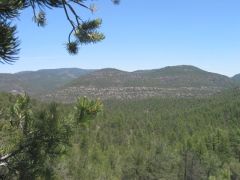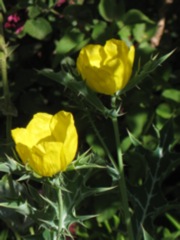-
Posts
123 -
Joined
-
Last visited
Content Type
Profiles
Forums
Events
Blogs
Gallery
Store
Everything posted by gwalchgwyn
-
I appreciate that he challenges the dominant scientific dogma, which I perceive as a machine that defines and authorizes itself. I don't have a problem with the very natural impulse to look at available information, observance, experience, others's experiences and form a probable story based on the information. We living beings have been doing this as long as we've existed. The appeal to science is the major damage in our era because it posits its truth as absolute. The very same culture that said/says 'God' and acted/acts astonished that there could be another version seems now to be saying 'Science' with the same astonishment. The effort is to come up with a One story that is the absolute truth period. We will always have our physiological, psychological, personal experiential, cultural, and animal lenses by which we perceive. To give some temporal perspective, Copernicus, Galileo, and others were viewed by the dominant paradigm of their times as obscure quacks too.
-

The introduction of religion into previous shamanic traditions
gwalchgwyn replied to zed240's topic in Ethnobotany
First I'd like to thank zed240 for introducing this thread. In light of our pioneering generation in this global information age, we have this incredible forum (www) to trade ideas on seemingly every level - and all are really welcome, including the read-onlies. We couldn't do this 30 years ago, so it will continue to be interesting to see the sharing and influences about this as well as every subject here. The discussion of Shamanism & Colonialism seems so central to the express purpose of this website and all of us as we gather around the plants that we love. It doesn't matter what information has been discussed before, as this is not a monograph, but something much more alive (as appealing as the archives are.) That being said, I offer my voice directly to some of what has been discussed above: To my mind zed240 you are absolutely correct in noting that the use of such terms as "San Pedro" and "Ska Maria Pastora" are a result of the Judeo-Christian Cultural Colonialism. Whether the appellation is an indication of coercion or resistance is a deeper matter. [i'm using the term Judeo-Christian (J-C) in the sense of a worldview as distinct from a theology or an intellectualized academic identity. I swear (!) that I am not trying to be daft when I say that I include in the J-C worldview its atheists, agnostics, pantheists, justhumans, and idon'tknowwhoiams, because the salient point is a way: values, manners, mores, mantras, definitions, expectations that altogether form a constantly shifting blob of a worldview that is well in place in our pre-instructive formative years. Not to be obscure about this very serious point: we are wired to see and do, try out or throw out. In my experience I have been severely punished by a 4 year old - with that ridiculous gleaming smug projectile grin - because she saw from her grandmother that this was how she is to act towards others (ie, the Chosen Punisher, who is also the Praiser on rarer occasions.) Another personal expample is a 70-year old man who declares himself intellectually to be Atheist, though his every thought and relating towards others is well-placed in his J-C cultural context (We're All One, Nobody's Perfect, Our Words Are Our Weapons, etc) In short, he learned during his formative years that he could and must defeat, symbolically, the Other - and even with an attitude that their expressions or identities are impositions! His worldview then is J-C, despite his intellectual protestations. No One is without cultural context.] As Micromegas says, most peoples, where J-C dominate, have primary elements of J-C influence (though I have to - and hate to - actually include both the Raramuri and the Huichol). There is simply no escape from an ideology that actually includes all people in its motivation to contact and give what it perceives as its gift to the world. [and I love, Micromegas, that you used the word 'virgin' to identify territory that has not been contacted by Christians!] One of the social formulas of any 'patriarchy' (which actually refers to a sky-god inclusive unitarianist worldview,) is to perceive the Other as someone to understand, such that one of the mantras is that we are to look for similarities, and avoid differences. This is painfully destructive, as it means that anything that the J-C does not get in the Other's ways or cosmology is simply thrown out. Some elements of the colonized, if nonthreatening to basic principles of the dominant though changing J-C ways are actually absorbed into its tremendous idealogical machine. It is essentially a racism of ideas: one looks for themself in the Other, and in this J-C actually has arranged a sense that it is not racist - that it is inclusive of all peoples, and indeed one sees in this and other colonialist cultures, like Aryan and Inca and Bantu, a heavy mix of ethnic backgrounds. They appear accepting and multiracial - but this is the result of coercive imperialism. In my academic anthropology experience back in the 80s, I learned from my professors of a term - syncretism - which was always delivered by these self-identified liberals of the age of the so-called movement, the Sixties, as a way for colonized to slip by the then violent oppression of Christian colonialism. So as said many times, 'San Pedro' was a way to protect the plant from demonization by the Christian conquerors. More complex examples come from such places as Bahia, where, we were told by our J-C professors, the colonized pretended to pray to Christian Saints, but were really, wink wink, praying to African Deities. The issue that I have with the syncretic argument is that it is essentially tokenized Noble Savage racism. The reality is that Christians did conquer most of South America. Whatever victories of the poor humble folk to fool their oppressors is moot considering that most of the people have been subdued. I rather look at the early Israelite writings, in particular, of Isaiah, who learned from the aryan king Cyrus, that conquered peoples are much more manageable if they are given a bone of inclusion. Previously, the Israelites simply killed in the tens of thousands any people who did not join their agenda. As the history of the concept Carnival shows, the colonized are even given special days of release in which they can openly insult their colonizers. Come Monday, it's back to work. This not killing of the enemy seems to me a successful - so far - strategy of a tribe that is determined to seek out and subdue Others to its primary ideology. Ostracism and Demonization of individuals are far more effective weapons than is a gun - plus the reward is livity - like a dog, upon given a task, the colonized can obtain food, shelter, as long as he or she makes movement and expression of 'humility' (ie a nonthreatening posture.) The mainstream use of ayahuasca in the 'west' is simply not an example of some non-racist open-mindedness, but rather more of an example of colonialism; if ayahuasca was not perceived in the context of the messianic saving jargon of the west, it wouldn't be so heavily used in these bizarre pseudo-spiritual events in the west. Aya was simply absorbed in the cultural context. I predict it will fail somewhat in this endeavor. As drugo has pointed out elsewhere, the west uses aya in a much different way. Which brings me to my next point, that Micromegas also mentioned, and that is one shouldn't necessarily, and to wit from a J-C social sphere, to criticize only the abuses of Christian colonialism. (One of the specialties of the J-C way is its own flagellant manner. It's always a member of the J-C that criticizes J-C culture. It's always whitey that criticizes whitey. The thrust is to be an advocate of what J-C perceives as fodder for saving.) The very name 'ayahuasca' is quechuan and so doesn't come from the original geographical (in this case therefore botanical) and cultural area of the source material for the drink. The Incan empire was ferocious and terribly abusive. One of the primary weapons, actually, of the Conquistadors was not the gun, not the horse, but the abuse of the Incans who had effectively alienated many of the peoples who they'd conquered themselves. Many people joined the Christians in the conquest of the Incans. The Christians, in that place and time, actually had an advantage in their conquest, which was the social gaming, honed over millenia, and derived from Indo-Aryan traditions, of following up the military conquest with a social conquest of punishment and reward - not killing the Other - but talking down to the colonized and showing their 'children' what they perceive as correct civilized behavior. The 'wicked ways' of the goyim was, to my mind, that they defended their territory and culture from a tribe determined to save them. We should give all people the dignity and integrity to be jerks toward Others that are perceived as a threat in a world of limited resources. Even if there is massive food surplus, it is within all living beings to be skeptical of a potential threat. The threat of a different tribe of the same species is very great because of the obviousness of similarity: we will be in competition with each other. Another important point expressed by some here is the probability that all humans have within their genes an ancestry of both conqueror and conquered, of slave and master. This widespread notion in J-C culture that a huge group of various tribes can somehow be conquered by a J-C culture and then all lumped together as the eventually poor humble non-violent conquered Other is a construct itself of the J-C conquerors, who then fill the land with members of previously conquered groups (ie most of us.) In this vein, cultural constructs such as Celts, Aborigines, Indigenous, and really any 'native' appellation is a failure to recognize their essential humanity. The people described didn't call themselves that, so Celtic to whom? Aborigine before whom? Indigenous and Native to whom? There is also the indignity of calling a people non-violent. Really the only non-violent of our kindred are any group of pioneers in a geography, since they wouldn't have to defend themselves. But that never lasts. The idea of the poor humble non-violent Taino or Aborigine, or "Native [sic] American [sic]" is a lie. Eventually people fight, make allies and so on. That is basic to our nature. I will also backtrack a bit here, because I use the term conquer and the obviousness of history is that it was very violent, but it seems to me that the social structure and people-management of J-C, like the Indo-Europeans before them really weren't genetic tribes, as all sky-god cultures are inclusive, but rather social systems that at some point gave an advantage of some type. Better military technology, or in the case of J-C culture, simply lying. The complaint among some American Indians is that the "white [sic] man [sic] broke their treaties." No shit! But now it's too late! But I perceive that the forked-tongue words-as-weapons advantage of J-C culture will run out of steam and morph into something else. Deception is not such an enduring advantage. Other advantages might not even be violent. The incoming may bring an economy (like cow herding, or horsepersonship) that may ultimately prove attractive to the previous tenants of the land. The incoming might in some instances even be attractive and healthy and wealthy. So 'conquer' though the right word in many instances, may also just be waves of social ways that prove advantageous for many. That is the express point of the Vedas and of the Abramic traditions. So sum up my position - as it stands at this moment - the unequal merging of cultural ways in both violent and friendly manner is an inevitability. The big question as I see it is how the concept of shamanism from non-shamanic cultures reflects either a trend to recover ways that are deep within our bones, or just the co-option of a term that is at the moment perceived as an item of personal power (it's cool, I'm into shamanism, etc). -

Insect farming thread
gwalchgwyn replied to shonman's topic in Sustainable Technologies & Ethical Living
I get the reticence. Taste mores, as with all matters of culture, are so deeply ingrained. Despite the news of the protein content and environmental ethics, I yet cringe when my cat snacks on locusts with gusto. However, if someone fed me locusts disguised as some sort of savory flour or seasoning, I probably wouldn't know the difference. Recent studies on the subject say that this is the direction that Insect Food is going. I welcome the movement despite my cultural bias. Viva Anthony Bourdain! -
-

Plant consciousness
gwalchgwyn replied to NightBreed's topic in Creativity, Spirituality & Philosophy
I was with Davis in his appreciation over this very subject when I read it in his One River, but have since become disenchanted by Westerners's amazement with the intelligence of other people. It relates to the Noble Savage mindset in which the unspoken premise is that the people they call 'native' and 'indigenous' couldn't possibly know that, could they, without the benefit of modern science, etc? In the example of caapi, the myopic Western Science[!] Messiahs are stumped by the lack of 'citation' or the much beloved 'evidence' for a clear proof of caapi use in Amazonia. They may be relieved at some point perhaps in some strata of Black Earth of some datable piece of caapi. Probably not. No evidence, so therefor we cannot say when caapi use began in Amazonia. Science has been around since before people. Beings look to their world, learn from experience, watch and listen to others, and then form an understanding from that knowledge. Bears have science. For that matter, many humans have a science that comes from watching and learning from the knowledge of bears! In the case of the peoples who inhabited Amazonia, the perception of plants is clearly different from much of the peoples of the modern world. My neighbor only knows plants inasmuch as he is told. The majority of nature is out there in the wilderness. This is not to say that he doesn't appreciate a wildflower in his yard, but the overall attitude is that plants somehow are submissive entities that need to be proved into his world. Contrast that common modern attitude with a worldview in which people are part of the same existence as plants - all plants. It is not unreasonable to conjecture that people who have been socialized to perceive all plants as relevant will make more effort to observe which plants might be used for food, medicine, and poison. There are other 'amazements' in the Amazon, such as the knowledge of toxin extraction from bitter Casava, or the knowledge of plants that make fish die, or the knowledge of frog poison that can be used to kill a monkey or an enemy. If we look at the number of additives to caapi - in addition to the two essential ingredients - we can see a huge list of plants that are used for various effects. This shows a set of cultural perceptions in which there is a high degree and long history of observation and practice and shared knowledge. If we look at the extensive period of self-training in shamanic society, we see the same purposive observant attitude (think Shulgin) toward the plant subjects. I find it unreasonable to conclude that the caapi knowledge - as awesome as it is - to be a matter of amazement in societies that have such keen tradition and inclusion of plants in their worldview. In addition, it seems likely that the peoples who inhabited Amazonia have been relating to plants in this way as long as they have been there. -

Plant consciousness
gwalchgwyn replied to NightBreed's topic in Creativity, Spirituality & Philosophy
The problem as I feel it Messianics tend to create deserts Shoving plants into their faces - Prostrating flagellants, Searching the stars to get back To the Garden Panic contrived by a scribe a long time ago. It is interesting to contrast - to the dismay of Unitarianists - the difference in two plant conceptions: In the Western worldview, among other skygod worldviews, the plant does something for the consumer: it fixes; feeds the fantasy; is 'transformative' for what it perceives to be its own sick society; an escape from the inevitably boring, abusive reality. In some Other worldviews the human perception is seen as limiting by its cultural and primate lens; the consumption of the plant is perceived as a way to understand the real. Whether or not a plant can through the individual human perception transcend its host's cultural story - or not - seems to me of paramount importance in our current stage of shared information. -

Books that have changed your life and why
gwalchgwyn replied to Halcyon Daze's topic in Creativity, Spirituality & Philosophy
! It's like meeting someone at 2:19 a.m. on a mindbender ! but in my opinion undeserving of the elitist demonization often attributed to it (which sets up a hierarchy in which items must be explained to the oh-so-humble in charge.) The fun doesn't really start in Ulysses until Chapter 4. I hope you enjoy One River; like many dynamic trajectories, it has an important coda that is so difficult to accept after the enthusiastic euphoria of the middle, so much so that one can scarcely complain that the myopic miss it altogether - but the fact remains that much has changed from the time that Davis was there and what is happening now (Aya tourism; the 'genuine' shaman experience; & worse, the wholesale co-option of the primary plants with a sky-god Western agenda and its backwards story...) To get a feel for this awed and marveling person, check out some of Davis's youtube appearances; one may ride his magic carpet around the world in just 20 minutes - highly recommended! Videodrone I appreciate your words on how books can be transcendent - like other things - for us, such that everything after the experience is a new world, like a caterpillar emerging from its chrysalis. I've read 2 on your list: Into the Wild & Siddhartha, the latter of which I enjoyed so much I slipped it into the bag of a sleeping traveller on a train in Philly; how wonderful, I imagined, to wake up to such an unexpected gift. Now, the act seems presumptuous, but I would've enjoyed the gesture. Am looking forward to reading Steppenwolf and The Book - Thank You, from this grateful, sleeping traveller... -

Books that have changed your life and why
gwalchgwyn replied to Halcyon Daze's topic in Creativity, Spirituality & Philosophy
Ulysses was my first of just 2 mindblowers for me for a few reasons: 3 dimensional; narrator presence; attention to detail, especially the detail of mind; and primarily, its exposure of narratology in the constructs of definitions and therefor, reality. -

Documenting and breeding for traits in Trichocereus
gwalchgwyn replied to deadhor5's topic in Cacti & Succulents
I get both sides; seems that we are at the accelerated end of thousands of years of Homo-Tricho synergy. Perhaps the spineless select us for suitable habitat? -
I agree with you on this cultural tendency toward the superlative. As a Southwestern North American, I see the mostly dominant group chatting up the Scolville Scale: always the next best thing that brings them a perceived power from the plants they grow/eat. In this border region's chilli-offs, it is always the Northies that create the hottest 'sauces' with the most insensible combinations. Though the heat - in the proper dosage - can be validly understood as medicine for a few reasons that include the effect of cooling the body, the culinary use in my experience is two-fold: Not only are good Jalapenos (which vary in heat) great tasting, but the heat has an instant reaction to the oral salivary glands that then coat the tongue's taste buds and creates a film that seems to enhance other flavors as well, so that the overall effect of a great meal is that the distinctive individual flavors are savored for hours after. With bhut jolokia last year, all I could do was excise the smallest piece to treat a sudden toothache, and cayenne is notable for its health benefits, but for flavor the heat of the hottest Jalapenos, or a milder-than Habanero chinense with that family's great flavor, or a fruitier Aji from the Andes are all superlative flavor enhancers to this elfkin.
- 13 replies
-
- 2
-

-

Have you ever met a psychopath (corporate or otherwise)
gwalchgwyn replied to Zen Peddler's topic in Chill Space
Western 'Civilization' is psychopathic! If you look at the definitions you see words like "lacks empathy" "self-serving" "prone to violence" - but wouldn't it be that anyone who for whatever reason did not subscribe to the dominant social order be so considered? Who is most likely to not accept the bizarre manners and mores of an insane society? The primary tenets - however individuals identify themselves within - of Western 'Civilization,' among others, are completely lacking empathy for any system that it cannot somehow reconcile to its own agenda, it is self-serving in that it excludes Others and Other Ways of Knowing that it cannot understand, and it is extremely violent - what it sometimes calls Peace - when people do not conform to its basic presumptions of what community and society and humanity is supposed to be! ...and we are to be grateful that it includes everybody in its program... "It is no measure of health to be well adjusted to a profoundly sick society." - Krishnamurti -
Aesthetically I have the same issue that I often have with plants: that is I love the one that is in front of me. all of these amazing lifeforms with incredible colors and habits! I love August in my clime - that's the climax of the rainy season - to see the Muscarias even before they emerge from the pine duff, the glassy creekside minis and the woody shelf fungi as well. It is more a minority of fungi that I don't like, such as those that cluster and bloom so quickly and leave a gooky inky black mess in their wake; but most I love the look of. Culinarily I love the earthiness of the more common ones like Shiitake, and though I am limited in my eating experience, I did encounter an Amanita called Caesar's Amanita (there are a few subgroups of them) that I was careful to ID and enjoyed at my campfire one summer - so delicious!
-
From the album: The Garden
Not sure if this is B. suaveolens; the pink parts begin their first day pale yellow, then turn this color for the duration ~ -
From the album: The Garden
-
From the album: The Garden
-
From the album: The Garden
~ showing 2 color variations ~ -
I'd stress the trust factor that others have mentioned - I'd been buying seed/plants from a retail source for over a decade - despite the reality of money exchange, the feeling is that I became somewhat part of a family of plant concerns, such as germinating rare cacti from seed, preserving diversity by home-growing, etc. So recently I was pleased to have been sent a wholesale price list, in which TBMs, for example could be purchased for a little less than retail. Once trust is present, it's not really competition but the continued livity of the plant itself that has trained us primates to provide adequate environment for their continuance.
-

Are the Current Penalties for " Rock Spiders " Adequate ?
gwalchgwyn replied to Heretic's topic in Chill Space
The problem as I see it - of which I am sure to be in the minority - is that Dragon Slayer (Indo-European/Abramic) Cultures require the existence of demons from their own creation story for the specific purpose of defeating them. As long as the story persists, they will continue to create from without and within their own populations characters that fit this demon profile. In slaying the dragon they perceive that they are securing a healthy sane and prosperous community for themselves. The Dragon, which is symbolically identical to the Snake and the Giant, refers to anything and anyone who does not conform to the fantasy story. What they do not understand is that they need these demons - and more importantly - they create these demons out of anyone in their midst who might fit their terribly infantile psychotic paranoid worldview in which that old Tautology is well in place: me good, not me bad. These horrible actions must be the result of not just years, but generations, of abusive ostracizing of the Other until it reaches in said individuals these horrible results. Consider that it is that cultural story that made them, and then kills them, hence the fantasy continues. This is similar to the violence taboo that often is derived from the very source of the violence: that is, a systematic use of non-physical violence, such as mental, emotional, social, economic, etc, that builds up to the point that it is then manifest in these horrible actions in people who would otherwise not be inclined in that way. When we seriously analyze the examples of school violence, we see in the perpetrator a sort of receptor of years of abuse that then explodes; look at them: they would not naturally be like that; they were bullied, their home or societal situation was not conducive to a decent livity; it isn't something in their genes, a bad seed, etc; it is that a system of abuse created them; the very Prohibitor is the Perpetrator, not the actual person who did the crime - he or she is just a pawn in the drama. It is a sort nightmarish sacrificial ritual in which we all have to play a role in a phony drama with real consequences that perpetuates a cultural story of domination. For the persistence of the view that there is something within that person (Original Sin, anyone?) that is the cause gives the real perpetrator, which is the dominant cultural story, license to distance themselves from those people and more importantly, from their own involvement in the creation - out of a real human - of a bizarre cultural persona that would not otherwise exist. This is the precise behavior of the indignant conquerors in recent history toward their victims, despite the current habit of conquerors to tokenize the descendants of the conquored. If we look at the population of people who have with the best evidence committed the most heinous of crimes and who are in prisons for their crimes, we see a cultural pattern - not in all cases, but in most - of people who in some way have been since birth systematically shut out of the rewards of the dominant group. Is it skin color? accent? a habit of looking at evidence? There seems to be little that the dominant group won't demonize in some way to fill their story's unquenchable hunger for victims. Consider too that in our site's subject of interest, that their has been a long history in which what we today call herbalists and scientists who were likewise held with suspicion and at times subject to the most horrible treatment. There have been times in the past of our ancestors, when people just like each and every one of us, would have been viewed suspiciously and treated as such. There comes a time, which I call the Fuck It Point, when people who are socially abused explode and actually manifest the very behavior that their abusers require of them. The manner of the Dragon Slayer complex is comparable to the rapist, breathing down his victim's neck: tell me you like it; it then acts all astonished and indignant at the demon-creature that it created. Notably there is not much literature in Dragon Slayer Cultural Complex that looks critically at this very important social issue in which lives are pawed to death (aside from original sources, which are complicit). For critical discussions, one would do well to look at Pendell's Paganum chapter. Another interest source on Giants in Western 'civilization' is JJ Cohen's book on Giants, which discusses at length the need for Western Society to create and then kill it's demons. We are very much in the dark ages of understanding. -
Very interesting thread! In the vein of relatedness to SA cultures and their use of plants, BK from SacredSucculents made some seed collections from what appears to be extensive farming at prehistoric SA sites, a sort of living archaeology. Not an ad, since I realize that most interested folks are already aware of SacredSucculents, but I thought relevant to the discussion. Anyone interested in what they've found, check out: sacredsucculents.com/andean-ethnobotanical-collections/ (I messed up the link, but it's in the US domain WWW)
-

Correct time to put the plants outside?
gwalchgwyn replied to hostilis's topic in Cacti & Succulents
Greets Hostilis - 'though USDA zones are mutable, I'd guess that I'm slightly 1, poss. 2 zones warmer than you, so I thought I'd share my experiences anyway. I also use Terracotta to wick up excess moisture - put mine out in late February, when we were unseasonably warm - it dipped down to below freezing only once, and obviously for a short time. I always keep mine under shadecloth (but where the sun's warmth gets to them), and I am also tentative about watering for the first few weeks. Had a few burn when spring winds lifted the cloth, but otherwise healthy. we are now in drytime, so I water once every other week even though it has only now lifted to 40s F at nights. we also get heavy summer rains (which they all love, that seems to be the climate at least for the SW & Northern Mexico species, but the Trichos love it too, as the temps by then are 80s F). Happy growing! -

wut mutant has been doing during 2013??
gwalchgwyn replied to mutant's topic in Creativity, Spirituality & Philosophy
Listening back on your original I don't hear those influences I'd mentioned after all - I shouldn't have used the word influence, because that suggests derivation (although all sound/thinking come from a place, even if fragmented). Anyway, I didn't mean to suggest that derivation - yours does sound very original and not as old-fashioned as Autechre & Vainquer. I think that Autechre came to mind because they have a model in many of their tracks of starting out with heavy percussion that seems haphazard, sometimes with 2 percussive threads that don't at all seem complementary, but which nevertheless end up in slight gradual manipulation of loops to come together & make sense, then, often halfway through the track they'll introduce air or chordage that begins quietly but ultimately gets louder and takes over the percussive. My favorite of theirs is garbagemx36 from the garbage EP that in some markets is coupled with Anvil Vipre as Tri-Repetae. But no, listening back I don't actually see influence, just some of that pattern. And your track has much more energy than Vainquer. I think I mentioned the latter for his persistent lo-fi looping with seemingly only the slightest of change to eventually enter a new atmosphere. Perfect for 2 a.m. But again, I don't see influence there either. The Electronic Music Age is as you say, extremely varied. I remember back in 1998 seeing the 3 who called themselves WE. They were inside of a huge plastic bubble. People moved in very interesting ways to their music, but they'd prolly bore a more mainstream raverkind. Supercars - oh - now I get it! the brief interlude at (1:25) got me. Thanks











